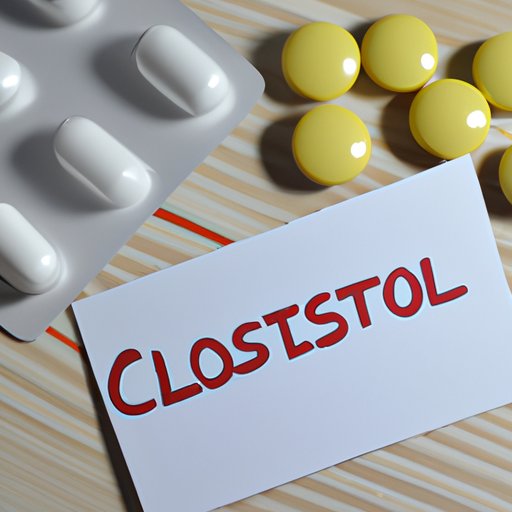
I. Introduction
High cholesterol is a major concern for heart health as it can increase the risk of heart disease and stroke. While diet and exercise play an important role in managing cholesterol levels, medication is often necessary for those with high cholesterol levels. In this article, we will explore how cholesterol medications work and the benefits and risks of using them.
II. Basic Science of Cholesterol and Heart Health
Cholesterol is a waxy substance that is produced naturally by our liver and also found in some foods. While cholesterol is necessary for our bodies to function properly, excessive amounts of it can contribute to the development of heart disease. There are two main types of cholesterol – LDL (bad) cholesterol and HDL (good) cholesterol. LDL cholesterol can build up in the arteries, forming plaque that can block blood flow and cause heart attacks and strokes, while HDL cholesterol helps to remove excess cholesterol from the bloodstream.
A cholesterol ratio is the ratio of total cholesterol to HDL cholesterol in the blood. A higher ratio indicates a higher risk of heart disease. Experts recommend keeping your cholesterol ratio below 5:1.
III. How Cholesterol Medications Work
There are three main classes of cholesterol medications – statins, bile acid sequestrants, and fibrates.
Statins work by blocking an enzyme in the liver that produces cholesterol. This leads to a decrease in LDL cholesterol levels and an increase in HDL cholesterol levels. Some common brand names for statins include Lipitor, Crestor, and Zocor.
Bile acid sequestrants work by binding to bile acids in the digestive system, preventing them from being reabsorbed. This leads to an increase in bile acid production, which in turn causes the liver to use excess cholesterol to produce more bile acids. This results in a decrease in LDL cholesterol levels. Some common brand names for bile acid sequestrants include Questran, Welchol, and Colestid.
Fibrates work by decreasing the production of triglycerides (a type of fat in the blood) and increasing HDL cholesterol levels. Some common brand names for fibrates include Lopid and Tricor.
IV. Risks and Benefits of Cholesterol Medications
While cholesterol medications can be effective in lowering cholesterol levels, they do come with some risks and side effects. Some common side effects of statins include muscle pain, liver damage, and an increased risk of diabetes. Bile acid sequestrants can cause constipation and may interfere with the absorption of other medications, while fibrates can cause stomach upset and gallstones.
However, the benefits of using cholesterol medications often outweigh the risks. According to the American Heart Association, statins have been shown to reduce the risk of heart attacks and strokes by up to 30%. Bile acid sequestrants and fibrates can also be effective in lowering cholesterol levels, particularly when used in combination with statins.
It is important to work closely with your doctor to determine the best cholesterol medication and dosage for you. Your doctor will also monitor your cholesterol levels and check for any potential side effects.
V. The Role of Diet and Exercise in Cholesterol Management
While cholesterol medications can be effective, they are not a substitute for a healthy lifestyle. A healthy diet and regular exercise can help to lower cholesterol levels and reduce the risk of heart disease.
Some dietary changes that may help to lower cholesterol levels include reducing saturated and trans fats, increasing fiber intake, and consuming more fruits and vegetables. Exercise can also help to increase HDL cholesterol levels and improve overall heart health.
Cholesterol medications can complement lifestyle changes, but they should not be seen as a replacement for them.
VI. Frequently Asked Questions About Cholesterol Medications
Q: How effective are cholesterol medications?
A: Cholesterol medications can be very effective in lowering cholesterol levels, particularly when combined with lifestyle changes. Statins, in particular, have been shown to reduce the risk of heart attacks and strokes by up to 30%.
Q: How long do I need to take cholesterol medications?
A: The duration of cholesterol medication use will depend on your individual situation and risk factors. Your doctor will work with you to determine the best treatment plan.
Q: Are there any natural alternatives to cholesterol medications?
A: While lifestyle changes like diet and exercise can help to improve cholesterol levels, there are no natural alternatives that have been proven to be as effective as cholesterol medications.
VII. Conclusion
Cholesterol medications are an important tool in managing high cholesterol levels and reducing the risk of heart disease. There are different classes of cholesterol medications that work in different ways to lower cholesterol levels. While they do come with some risks and side effects, the benefits of using cholesterol medications often outweigh the risks. A healthy lifestyle that includes a balanced diet and regular exercise can also help to improve cholesterol levels and overall heart health.




